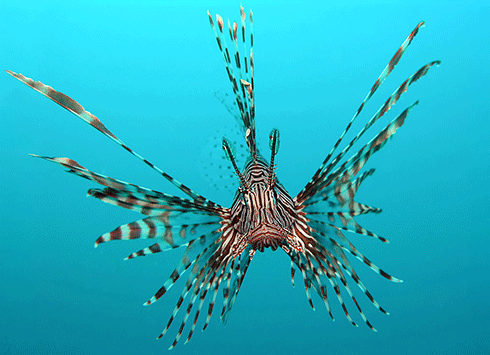
|
Published: 28 October 2013
Lionfish’s success due to ‘cloak of invisibility’
While red lionfishes are a drawcard for diving holiday-makers on the Great Barrier Reef, the species has become a successful and voracious predator in the Caribbean, where it is destroying the reef ecosystem. A new study by Australian scientists suggests one reason for this success is that red lionfish are invisible to small prey fish.

|
|
Small prey fish in the Caribbean, where the red lionfish is a pest, are unable to recognise the striped intruder as a predator. Credit: Jens Peterson/Wikipedia
|
‘Lionfish are native to the Pacific, but have been taking over the Caribbean Basin ever since they were accidentally introduced almost 30 years ago,’ James Cook University’s Professor Mark McCormick said.
‘Their extreme success as an invasive predator has long been a mystery to ecologists worldwide.’
Professor McCormick and JCU colleague, graduate student Oona Lönnstedt, say the study – published in the latest issue of PLoS ONE – suggests the solution in part lies in the power of camouflage.
‘For over a decade, scientists have tried their best to understand how these gorgeous but deadly predators can wreak such havoc on their invaded ecosystem,’ Professor McCormick said.
‘Almost all of the work to date has focussed on the consequences of the interaction between these predators and their prey in areas where lionfish are invasive species.’
The new study suggests that lionfish are like ‘ghost fish’, able to feed on anything and everything without being discovered until it’s too late.
‘We tested the response of small prey fish to three different predators, one of them the lionfish,’ Ms Lönnstedt said.
‘Surprisingly, the common prey fish were unable to learn that the lionfish represented a threat, which was very different to their response to two other fish predators.
‘Lionfish were able to sneak up on their prey and capture every single one, while the other predators had much lower feeding success.’
With release from any natural enemies in their new Caribbean habitat, and no problem catching food, the lionfish are practically unstoppable say the scientists.
Source: JCU



